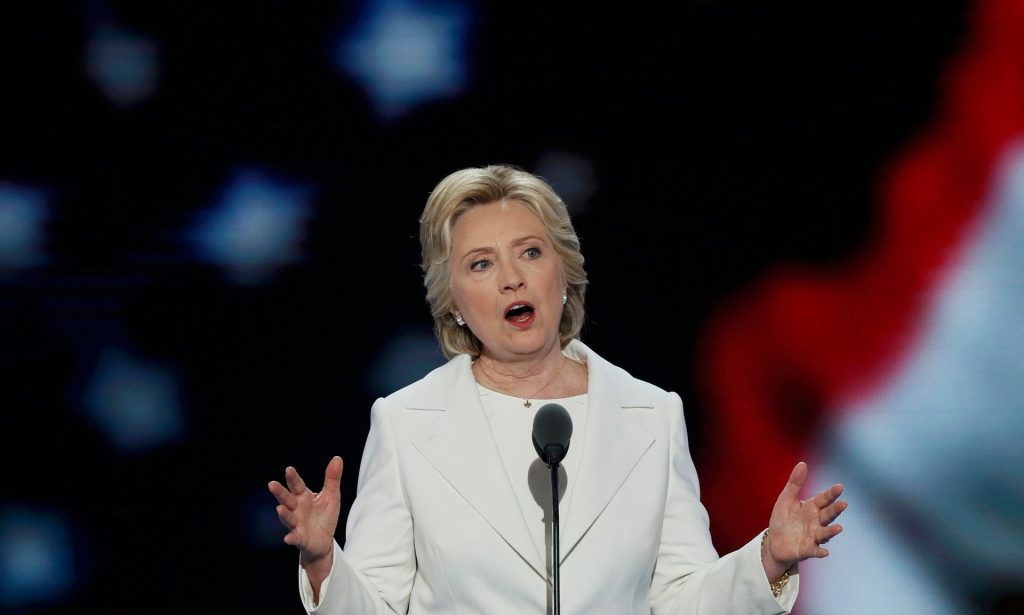
Photograph: Mike Segar/Reuters
For better or for worse, history will be made when the United States votes this November. Should Hillary Clinton win, she would embody the progress a society can make in a lifetime; the electors of the first female president would include those born before women gained the right to vote.
Her victory would demonstrate how unthinkable ideas can become first conceivable and then a matter of fact. So too, unfortunately, would the triumph of her opponent. A Donald Trump presidency might well demonstrate how quickly a society can unravel. The symbolism of a female president matters much less than the impact her leadership would have on the lives of women across American society compared with that of an unabashed misogynist. Should she lose – and it is not yet clear whether her party truly grasps what a very real possibility that is, despite worrying polls and her powerful speech in Philadelphia on Thursday – the US will have chosen a man who threatens not only the dignity of women and the security of religious and racial minorities, but democracy itself in America and stability beyond its shores. Never in living memory have electors faced a starker choice, as Mrs Clinton deftly reminded them.
Her opponent is not only a bigot and a bully, but a thin-skinned braggart – and “a man you can bait with a tweet is not a man you can trust with nuclear weapons”. He is ignorant on both immediate political issues and the state of the US and the world. He leaves behind him a trail of shabby business dealings. He supports nuclear proliferation, has justified torture, called for a ban on Muslims entering the US and this week appeared to invite Russia to hack into and publish his rival’s emails. Yet he remains buoyant. Absurd men, “little men … moved by fear and pride”, may be as dangerous as more apparently credible menaces.
The Democratic candidate is by instinct more hawkish than Barack Obama. Her promise to protect Main Street from Wall Street sits somewhat uneasily with her list of donors. She was pushed into adopting more progressive positions because of the stronger-than-expected challenge from Bernie Sanders. She has tended to shut out those beyond a trusted inner circle, a trait that was perhaps reflected in the controversy over her use of a private email server as secretary of state. Though she escaped prosecution, the FBI’s director described the handling of messages as “extremely careless”.
Such concerns, though real, are trifling if set against the prospect of Mr Trump winning. They exist in part because of her years in vicarious, elected and appointed office; as Mr Obama pointed out, no one has been more qualified to serve as president. Equally, it is hard to think of anyone less suited than her rival. Faced with an occasion he could rise to, he invariably lowers the tone instead.
By normal standards, and despite some lingering and vocal resentment from supporters of Mr Sanders, this has been a successful convention: neatly choreographed with clear and consistent messages. Having won her party’s nomination, she now fights for the nation’s trust. Supporters have had to portray a potential commander-in-chief as a hug-loving, kiss-blowing grandmother – and, most tellingly, as “a girl” – to counter perceptions of successful women as less likeable. An experienced political hand, the prospective Democrat successor to a two-term Democrat president, is recast as “the best darn change-maker”.
Mrs Clinton’s team has deeper pockets and should be able to count on an efficient on-the-ground campaign. But neither the media nor politicians have yet fathomed how to challenge Trumpian “post-truth” politics and address the suspicion, fear and rage fuelling his rise, and their causes. Framing and messaging are not enough, and nor is the promise of sober proficiency. Her choice of Tim Kaine as her running mate is pragmatic but uninspiring.
Mrs Clinton must convince the public that there are reasons to vote for her, and not simply against Mr Trump. She acknowledged that her party hasn’t shown “that we get what you’re going through, and that we’re going to do something about it”. It was reassuring that she talked policy too, including a pledge to introduce the biggest jobs program since the second world war in her first 100 days and to invest in infrastructure projects. The oddity of today’s politics, and the broadly felt concerns behind them, means that policies pressed on her by the leftwing insurgency – notably opposition to the Obama administration’s Trans-Pacific Partnership trade deal – may sway some of those tempted to back her rival.
Britain has already seen how understandable anger and estrangement from traditional politics can fuel a hunt for scapegoats, and convince voters there is no point playing it safe when you have nothing to lose. Opponents of Brexit woke up to the threat far too late. The US cannot afford a similar error. Mrs Clinton’s speech was a good start, but there is a long way to go in a few short months.

